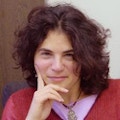
Dorit Aharonov is a faculty member of the Rachel and Selim Benin School of Computer Science and Engineering at Hebrew University, Jerusalem, Israel. Aharonov completed her B.S. in physics and mathematics at Hebrew University, then continued to one year of M.S. studies in physics at the Weizmann Institute of Science, followed by a Ph.D. in computer science and physics at Hebrew University, which she completed in 1999. After a postdoc at the Institute of Advanced Study, Princeton, and at University of California, Berkeley, she had joined Hebrew University in 2001.
In 2005, Aharonov was profiled by the journal Nature as one of four “young theorists who are making waves in their chosen fields,” and in the following year, she received the Krill Prize for Excellence in Scientific Research. In 2011, she was awarded the European Research Council grant for starting researchers, and in 2014, she was awarded the Michael Bruno Memorial Award.
Aharonov’s research attempts to use the computational perspective to clarify how quantum systems differ from their classical counterpart. Starting from topics more related to computer science — in particular quantum error corrections and fault tolerance, quantum algorithms, and quantum cryptographic protocols — her research has expanded in the past decade to Quantum Hamiltonian Complexity; this includes adiabatic computation, computational hardness of ground states of Hamiltonians, area laws and more. Overall, she is interested in the way fundamental questions about quantum mechanics — and in particular about entanglement — can be cast in terms of computational complexity questions.